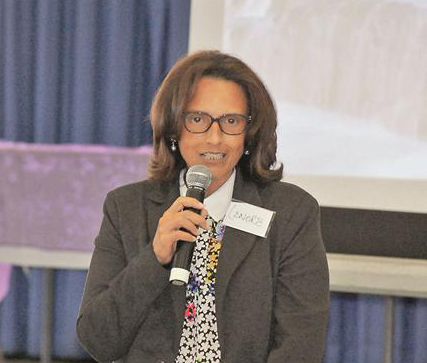Dr Mariame Sylla is Chief of Health, HIV/AIDS and Nutrition at UNICEF South Africa
SPONSORED
This webinar was hosted by the Mail & Guardian and Unicef. It featured Dr Mariame Sylla, Chief of Health, HIV/AIDS and Nutrition at Unicef South Africa; Professor Lesley Bamford, Specialist in the Child and Youth Health Directorate in the National Department of Health, Ministry of Health; and Lenore Spies, Senior Technical Advisor: Nutrition, Child Health and PMTCT, Maternal, Adolescent and Child Health (MatCH) Institute. It was facilitated by Gushwell Brooks from 702.
Professor Lesley Bamford said that South Africa needs to deal with Covid-19 but it also needs to deal with child nutrition. More than a quarter of our children are stunted (have not reached expected height) from long-term malnutrition or under-nutrition. Families need the correct knowledge to provide adequate nutrition; part of this is breast-feeding until infants are two years old. Health workers play a very important role, providing interventions; government departments need to work together to improve household food security, water and sanitation. Government is providing a package of services, but this has been disrupted by the lockdown and pandemic.
 Professor Lesley Bamford is a Specialist in the Child and Youth Health Directorate in the National Department of Health, Ministry of Health
Professor Lesley Bamford is a Specialist in the Child and Youth Health Directorate in the National Department of Health, Ministry of HealthLenore Spies said that for effective prevention and intervention, children with malnutrition must be identified, which requires community, family and health department interventions. Dr Mariame Sylla said that it is a collective responsibility; everyone from the private and public sector must come together to support the children of South Africa.
The pandemic has heavily affected the school feeding scheme or school nutrition programme. This programme has started up again, although there have been teething problems. There has been an increase in the child support grant, but there have been some uptake problems there too. The health department has been trying to restore service delivery and minimise disruptions to health services, but it has noted that attendance at health facilities has gone down. Early identification and management of malnutrition has been prioritised.
 Lenore Spies is Senior Technical Advisor: Nutrition, Child Health and PMTCT, Maternal, Adolescent and Child Health at the (MatCH) Institute
Lenore Spies is Senior Technical Advisor: Nutrition, Child Health and PMTCT, Maternal, Adolescent and Child Health at the (MatCH) InstituteUnicef does not directly provide food, but it does try to ensure that food that is distributed children is of good quality and that it adheres to certain standards. Children in the poorest areas are prioritised when it comes to food parcels. Co-ordination among all the role players is essential, for example regarding the messaging around Covid-19, to use existing platforms effectively. Unicef is working with the government and civil society organisations in identifying where there are areas with more malnutrition so that interventions can occur. Lessons are drawn from other countries and used locally, with adaptation to local contexts. Unicef has called for an advisory committee to be set up on the issue of child nutrition in South Africa.
There has been modelling that shows there will be severe malnutrition because of the pandemic, and this will lead to many deaths, especially as fewer people come into hospitals and clinics. Warning signs of malnutrition will be missed as more attention is given to dealing with Covid-19 cases. Many children die at home and don’t even make it health facilities. We must not let the children fall through the cracks.
Children are being impacted severely across the world because of things such as reduced immunisation as health services prioritise treating Covid-19 cases. This is despite the fact that one in three children globally are malnourished, and that half of childhood deaths have malnutrition as their underlying cause. Many gains made in nutrition for children will be lost because of the pandemic. “Children must not become the face of the pandemic,” warned Sylla.
 Gushwell Brooks is a presenter on 702 and CapeTalk
Gushwell Brooks is a presenter on 702 and CapeTalkNo health system has been adequately prepared for Covid-19, even the better resourced ones. It is the new normal, and we are going through the initial surge, which has disrupted services. We need to rise to the challenge of dealing with the pandemic, but we mustn’t lose the ground gained regarding child nutrition. Collaboration must take part at both government, provincial and especially at local levels; there must be mitigation of the current crisis, and also planning for more cases of severe malnutrition.
The food industry can be an important player in the food security realm. Prices increases must be regulated and food that is not healthy should be promoted less. How can one influence the private sector regarding food prices? Some countries do have fiscal policies regarding this; South Africa now at least has policies regarding sugar. We HAVE to engage with the private sector about this, but it’s a complex issue.
There are many determinants regarding food security — politics, economy etc, but there does have to be restructuring at a macro level to close the inequality gap. Covid-19 does not affect all people equally; it affects the poor more severely, and it may widen the inequality gap. Nutrition is a direct outcome of development. Children must be safe-guarded during this pandemic; it is everyone’s business, from government to schools to households. Our children must not only survive, they must thrive.